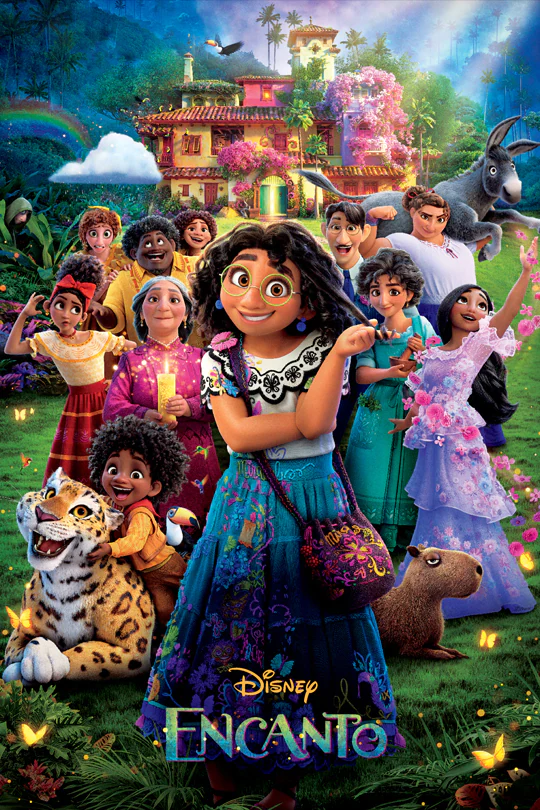Discovering the hidden ‘Encanto’
“Encanto” has recently surged into one of the best movies of this year. However, I have noticed some fans forget the meaning of the movie or only focus on a few characters, completely forgetting the important topics covered, like psychological tropes, and rich culture that can be discovered in a Latino family.
Watching “Encanto” was one of the first times I was able to see myself represented in a movie, both in appearances and culture. As a child, watching Disney movies featuring mainly white characters made me feel out of place in my own skin, as the characters I looked up to tended to set unrealistic standards of beauty.
The movie, as colorful and humorous as it is, covers intergenerational trauma, a prominent issue today. Intergenerational trauma is passed down by generations when a traumatic event affects multiple family members, or a culture, according to the American Psychological Association. This movie is a beautiful representation, highlighting the aftermath of a family who has overcome that.

Throughout the movie, Mirabel is constantly left out, as without a gift she is considered an outsider in her own family. However, she realizes she cannot stay on the sidelines waiting for a miracle. When she realizes this she begins to find a way to save her family, hoping to be recognized for something other than a power.
The writers did an exceptional job bringing out the spark in the characters. Everyone is given a struggle and a distinctive personality.
For example, Bruno is the scapegoat of a family. A scapegoat is the person who a family blames for their problems as a means of deflecting attention from real conflict, according to Psych Central. The scapegoat is usually the one who is able to see the real conflict, and this is true in “Encanto.” Bruno’s gift was to see the future, but his visions were always perceived as negative.
Bruno’s character was nothing like he was described to be. As it turns out, Bruno never left, and instead stayed in the walls. It was honestly heartbreaking to see — all those years Bruno stayed in the walls all by himself. He had even drawn a plate with his name on it, showing he really cared about his family.
Isabela, on the other hand, represents golden child syndrome. She admits to feeling like she has had to maintain this perfect status her entire life. Golden child syndrome is when a child is controlled to ensure that the child upholds the parents’ “perfect” image and reputation, according to MBG.
With Mirabel’s help, Isabela is able to break her idea of “perfection” and find her true identity. Mirabel bonds with her sister, but abuela finds out and blames Mirabel for their behavior.
Another aspect of the movie I enjoyed was the music. I especially loved “Surface Pressure.” This song held a lot of emotion and the lyrics were very relatable. A line that stood out to me in the song was “Give it to your sister, your sister’s stronger / See if she can hang on a little longer / Who am I if I can’t carry it all?” It was somewhat comical, since it talked about strength and super powers, but was still personal since I could relate to the struggle of keeping up with their family.
In the song, “We don’t talk about Bruno,” it is explained that Bruno would always ruin things, and that is why he was not talked about. Not only did the song give a newer perspective to him, but it was also extremely catchy!
Pepa’s powers are very interesting because her emotions control the weather. Whenever she feels a strong emotion like anger, or surprise a storm is stirred, and she is immediately told to stop it. It’s humorous while watching the movie, but I realized she is being told not to feel. Pepa is not allowed to show her emotions and is always told how she feels is problematic. When this severe emotional gaslighting happens, people are told their emotions are false and to calm down, completely ruining one’s self esteem and self image, according to psycom.
At the end, Abuela realizes that everyone is worth more than just their gifts and it was nice to see the Familia Madrigal accepting everyone for who they are. Even though we don’t have powers, every person is different and families need to understand that no matter people’s differences, accepting people for who they are is the most important factor in fostering successful relationships.
“Encanto” brought out emotions to a deeper level and the culture was apparent, from the food all the way to the music and colors. This movie brought laughter and tears — the perfect combination in a perfect movie.











